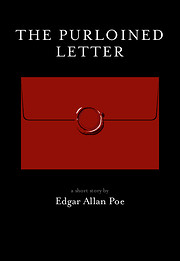

Fai clic su di un'immagine per andare a Google Ricerca Libri.
|
Sto caricando le informazioni... The Purloined Letter [short story] (1845)di Edgar Allan Poe

Sto caricando le informazioni...
Iscriviti per consentire a LibraryThing di scoprire se ti piacerà questo libro. Attualmente non vi sono conversazioni su questo libro. Crítica | A Carta Roubada, de Edgar Allan Poe: https://www.planocritico.com/critica-a-carta-roubada-de-edgar-allan-poe/ The Purloined Letter was originally published in 1845, and is one of three stories featuring the famous Parisian amateur detective C. Auguste Dupin. These three stories are considered early forerunners of the modern detective story. This case involves the blackmail of the queen. A letter from the queen’s lover has been taken. The police know who took the letter and are trying to retrieve it but all their efforts to locate it’s hiding place have failed. On being handed a cheque in the amount of 50,000 francs, Dupin was able to produce the letter. Using his method of identifying with the criminal, Dupin was able to put his mind to work and discover where the letter had been hidden. A simple story with the answer relying on the deductions made by Dupin who worked out that the letter’s appearance had been altered and that it was in plain sight if one cared to look. Having the detective simply use his brain to solve the mystery allowed this genre to become both based on action as in The Murders of Rue Morgue and on analytical thinking by allowing the detective to ponder the case and track down the clues through his own deductions as in this story. With this the third of the stories about the detective C. Auguste Dupin, he is approached by Monsieur G-, the Perfect of the Parisian police. A letter has been purloined from the Royal apartments, and although the thief is known, a Minister D-, the letter has not been found even after a very thorough search. Dupin postulates that sometimes events are simplier then they seem. This was an enjoyable mystery story nessuna recensione | aggiungi una recensione
È contenuto inThe Harvard Classics Shelf of Fiction [20 Volume Set] di Charles William Eliot (indirettamente) The Harvard Classics & Shelf of Fiction [71 volume set] di Charles William Eliot (indirettamente) Edgar Allan Poe: Collected Stories and Poems (Collector's Library Editions) di Edgar Allan Poe (indirettamente) The Murders in the Rue Morgue / The Mystery of Marie Roget / The Purloined Letter and other stories di Edgar Allan Poe Delphi Classics: Complete Works of Anna Katharine Green di Anna Katharine Green (indirettamente) The Fall of the House of Usher, and Other Tales and Prose Writings of Edgar Poe (The Camelot Series) di Edgar Allan Poe The Murders in the Rue Morgue / The Mystery of Marie Roget / The Purloined Letter / The Gold Bug / Thou Art the Man di Edgar Allan Poe The Works of Edgar Allen Poe in One Volume: Poems, Tales, Essays, Criticisms with New Notes di Edgar Allan Poe The Best Known Works of Edgar Allan Poe in One Volume: Poems, Tales, Essays, Criticisms di Edgar Allan Poe The Complete Tales and Poems of Edgar Allan Poe with Selections from His Critical Writings di Edgar Allan Poe Great Tales of Horror and Suspense; Weird Tales of Edgar Allan Poe: the Ghost Ship and Other Ghostly Stories, Dracula di Edgar Allan Poe The annotated tales of Edgar Allan Poe edited with an introduction, notes, and a bibliography di Edgar Allan Poe The American Short Story: A Collection of the Best Known and Most Memorable Stories by the Great American Authors di Thomas K. Parkes The Best of Poe: The Tell-Tale Heart, The Raven, The Cask of Amontillado, and 30 Others di Edgar Allan Poe Tales of Mystery and Imagination / Tales of Suspense di Wilkie Collins (indirettamente) The fall of the House of Usher and other stories (Classics of mystery & suspense) di Edgar Allan Poe È rinarrato inHa l'adattamentoHa come guida per lo studenteElenchi di rilievo
The brilliant Dupin uses psychological reasoning to deduce the hiding place of a stolen letter. Non sono state trovate descrizioni di biblioteche |
Discussioni correntiNessunoCopertine popolari
 Google Books — Sto caricando le informazioni... Google Books — Sto caricando le informazioni...GeneriSistema Decimale Melvil (DDC)813.3Literature English (North America) American fiction Middle 19th Century 1830-1861Classificazione LCVotoMedia: (3.46) (3.46)
Sei tu?Diventa un autore di LibraryThing. |
||||||||||||||||||||||||||||||||||||||||||||||||||||||||||||||||||||||||||||||||||||||||||||||||||||||||||||||||||||||||||
Characters: 8
Setting: 7
Prose: 8 (